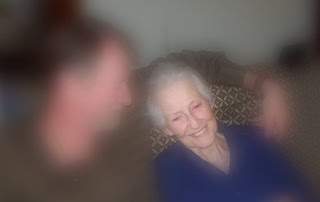There comes a point, in the process of falling in love, when it’s time to get down to brass tacks. You somehow have to get the difficult questions into the conversation, to figure out what it is, exactly, you’re getting yourself into. Taking advantage of a lull, you might press tongue to upper lip and look toward the sky as though a random question can be found there. So, um, what does a professor get paid exactly? How many children do you have? Any diseases I should know about?
And perhaps most important of all, for a woman, What kind of mother did you have, growing up?
“Flawless,” my husband-to-be answered, in a flash.
This was bad. The poor guy with the flawless mother was never going to find that again, most especially not in me. I’m not saying he or all men are trying to resolve an Oedipus Complex with their selection of partner, not at all -- but for them a mother seems to set a certain baseline standard for what an adult woman is. I could have been a huge improvement over Depressed Alcoholic Mother, or Trapped Emotionally Distant Mother. Smother Mother would have been great, as I only rarely develop the clinginess of a baby monkey. But just my luck. “Flawless.”
Worst of all for me, she really was. Her Southern upbringing was evident in every word that she said, in that slow, comforting, throaty drawl that, really, who couldn’t love? Tall and regal, she had just the most perfect frame on which to hang 1950s fashion. Picture June Cleaver, except born and raised in Knoxville, Tennessee -- for real. She was quiet and strong. Messes were cleaned up before the children looked over their shoulders to notice them, and she was reliable as the constant flow of new mornings since the dawn of time. Always found precisely where she was supposed to be. If Mama was not waiting at the bus stop as expected when the children got off, they freaked -- surely some terrible fate had befallen mankind and they were now standing on an evil alternative planet. For a whole lifetime, she steadfastly continued to wear classy, understated skirts and heels, preserving her boy’s vision of motherly loveliness decades and decades into his adulthood.
Well, I am tall.
* * *
Doug’s mother is 85 years old, and has Alzheimer’s Disease. Much of who she is has been torn asunder. I want to cry when I think about it; I want to give her back "flawless." The magnificent managerial skills she had that kept her family's world running so smoothly for so long. Those who never have experienced Alzheimer’s in their families may not know: suffering is involved. Sometimes. It is not a disease that, “thank heavens,” takes the patient’s every conscious understanding away, so that he or she at least does not know what is happening. She has waking nightmares terrifying as any that anyone could imagine, without even a small child’s capability to realize she is awake and the dream is not real.
Her husband of 60 years, Doug’s father, is able to provide her with the very best of care. It is no small relief that we can trust in his complete devotion to her. That is a gift, from a father.
